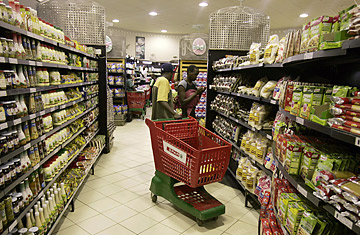
The Zimbabwean government's dollarization program has stopped inflation and made food prices more constant
Seated on a wooden chair inside his dilapidated shack in the Harare township of Mbare, primary school teacher Moses Majuru, 40, is both anxious and excited about the week ahead. Life has become a bit easier recently thanks to the Zimbabwean government's decision on Jan. 29 to abandon the Zimbabwean dollar for a raft of foreign currencies, including the U.S. dollar and the South African rand. "I am earning in real money. It feels good," says Majuru. "I can now put food on the table and feed my family." A smile spreads across his face.
The decision to "dollarize" Zimbabwe's economy, one of the first acts of the new unity government (including erstwhile enemies President Robert Mugabe and Prime Minister Morgan Tsvangirai), has brought a small amount of stability to the economically ruined country. All civil servants now earn a monthly salary of U.S. $100, while shops and banks accept dollars and rands. (See pictures of Mugabe's reign.)
The move to dump the Zimbabwe dollar has also stemmed the country's runaway inflation. This week the government announced that prices were 0.8% lower in January after years of multidigit increases. The last official measure of inflation, in July last year, put it at 231 million percent. (See pictures of money being printed.)
The change is more than welcome. Prices now stay constant for days — a novel concept in a country where shop owners had until recently recalculated prices twice a day. "This allowance, though not enough, sees me through the month," says Majuru. "I can plan what my salary can and cannot buy since prices have stabilized. I could not do that when our dollar was the official currency."
But not everyone is happy. Street vendors and people in the massive black market have been hit as business shoppers are turning to the formal sector for the first time in years. Competition has increased as well. Shops have suddenly started stocking goods that were previously unavailable. The goods range from basic commodities such as corn, sugar, soap, salt and bread to furniture, which Zimbabweans have had to travel to neighboring countries to buy. "Dollarization has thrown me out of business. No one buys from me. People now buy from shops and authorized dealers," says Tavonga Munjeri, who sells credit cards for cell phones. (See pictures of political tension in Zimbabwe.)
Zimbabwe is facing its worst economic crisis since independence almost three decades ago. On top of its abandoned, worthless currency, the once prosperous agricultural economy is bankrupt. The country's new Finance Minister, Tendai Biti, announced on Wednesday that Harare has a monthly expenditure of about $100 million but can raise only $20 million a month. The government estimates that an average family of five requires about $550 a month, far more than what most people earn. (See pictures of Zimbabweans voting.)
International institutions and Western governments have said they will assist Harare if the new government meets certain demands. "IMF staff stand ready to continue to assist the authorities through policy advice," the fund said in a statement on Wednesday, after its team finished a two-week visit to the poverty-stricken country. But "technical and financial assistance from the IMF will depend on establishing a track record of sound policy implementation, donor support and a resolution of overdue financial obligations to official creditors, including the IMF." Zimbabwe owes the IMF and other institutions more than $1 billion.
